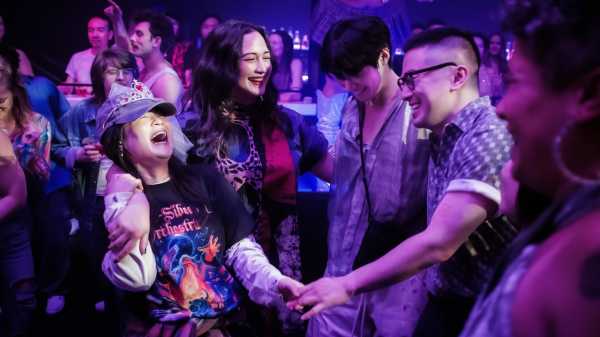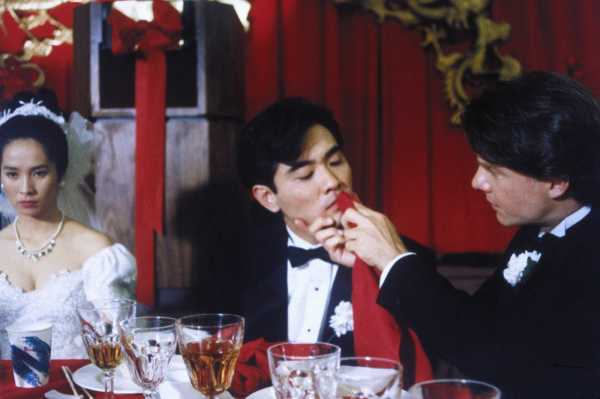
Save this storySave this storySave this storySave this story
It takes a while for “The Wedding Banquet,” Ang Lee’s 1993 hit romantic comedy, to get to the big event of the title, but it’s worth the wait. The bride, Wei-Wei (May Chin), and the groom, Wai-Tung (Winston Chao), look suitably stunning. The venue is an enormous Chinese restaurant in New York City, where platters of lobster gleam so sumptuously they could be anticipating the lavish feasts to come in Lee’s 1994 food-porn extravaganza, “Eat Drink Man Woman.” Lee films the wedding reception and its rituals with an almost anthropological curiosity, and the composure of his camera only heightens the brash, bacchanalian comedy of the proceedings. There are weird, humiliating games, bawdy speeches, bursts of boozy laughter, and a punitive spirit of newlywed hazing. The liquor flows so freely that the rest room nearly becomes a vomitorium. One of the few white guests murmurs, “God, and I thought the Chinese were meek, quiet math whizzes.” Another attendee wryly replies, “You’re witnessing the results of five thousand years of sexual repression.”
The actor who delivers that last line is Lee himself, making an uncredited cameo in one of his early breakthrough films. He might have been foreshadowing the rest of his career, as repression has proved to be his most durable and resonant subject. Lee has drifted freely between continents and eras, with results as different—and superb—as “The Ice Storm” (1997), “Crouching Tiger, Hidden Dragon” (2000), “Brokeback Mountain” (2005), and “Lust, Caution” (2007). But, again and again, regardless of time or place, he has rediscovered the same thread: the imposition of rigid social constraints upon uncontrollable desires.
In “The Wedding Banquet,” Lee shrewdly pitched the drama between two distinct but overlapping spheres of repression; he lovingly skewered the tensions and obligations at the heart of so many Asian parent-child relationships and merged them, almost seamlessly, with the agonies and anxieties of closeted gay life. The wedding started as an elaborate three-way ruse concocted by Wai-Tung, a gay Taiwanese American man; his white boyfriend, Simon (Mitchell Lichtenstein); and Wei-Wei, an undocumented Chinese immigrant. This marriage of convenience, it’s believed, will supply Wei-Wei with a green card and satisfy Wai-Tung’s Taiwan-based parents, Mr. Gao (Lung Sihung) and Mrs. Gao (Gua Ah-leh), who don’t know that their son is gay and have been pressuring him to find a wife and start a family.
But things go awry when the Gaos unexpectedly fly out to New York for their son’s nuptials, kicking the scheme into overdrive and setting the grand wedding feast in motion. The genius of the banquet sequence is that, even if the festivities do mark a collective release of tension, as Lee the bit player notes, Lee the director insures that the pressure never stops building. We see the discomfort in Wai-Tung’s and Wei-Wei’s faces as they’re marched through a gauntlet of forced cheer and made to down drink after drink. Everyone thinks they’re celebrating; they’re really drowning sorrows that they don’t have the freedom to express.

May Chin, Winston Chao, and Mitchell Lichtenstein in 1993’s “The Wedding Banquet.”Photograph from Samuel Goldwyn Films / Everett Collection
Now, more than three decades later, we have a new version of “The Wedding Banquet” before us. This one, set in present-day Seattle, was directed and co-written by the Korean American filmmaker Andrew Ahn; in a poignant touch, he co-wrote the script with James Schamus, Lee’s longtime collaborator and a co-writer on the 1993 film. The trickiness of the task before them is evident at the outset. In an era of widespread L.G.B.T.Q.+ acceptance, how do you fashion a breezy yet serious-minded romantic comedy predicated on the deceptions of the closet? When marriage equality is the law of the land—even if the current political order dispiritingly shows that all progress is provisional—what purpose does a new “Wedding Banquet” serve?
Ahn and Schamus seek to answer that question with the knowledge that acceptance brings pointed complications of its own. Angela (Kelly Marie Tran), an introverted research scientist in her thirties, may have come out as a lesbian years ago to her mom, May (Joan Chen), but that has hardly purged their relationship of unspoken resentments; it doesn’t help that May, gregarious and self-aggrandizing by nature, has become a social butterfly of the local L.G.B.T.Q.+ scene, winning awards for queer allyship as Angela stews quietly on the sidelines. Angela at least has a loving relationship with her nurturing, openhearted partner, Lee (Lily Gladstone), a community organizer of Duwamish descent who is eager for them to start a family. Angela and Lee are close friends with their tenants—Chris (Bowen Yang) and his boyfriend of five years, Min (Han Gi-chan)—who live in Lee’s garage. Chris, sardonic and jaded, is a queer-studies grad student on hiatus; Min, earnest and romantic, is a textile artist, as well as the heir to a Korean corporate dynasty.
It is Min’s overseas family that sets the story in motion. He’s in the U.S. on a soon-to-expire student visa, and his formidable grandmother, Ja-young (Youn Yuh-jung)—who doesn’t know that Min is gay, or that he has a steady boyfriend—insists that he return to Korea and take his place in the family business. An easy fix would be for Min to marry Chris, but Ahn’s “Wedding Banquet” isn’t interested in ease. Thanks to a cluster of contrivances—Chris is a commitment-phobe, a trait well sold by Yang’s comic petulance—Min ends up proposing a straight marriage to Angela. If they wed, Min can stay in the U.S. and avoid getting cut off financially; in exchange, he will use his fortune to pay for a round of I.V.F. treatments for Lee, who has yet to conceive after multiple attempts.
It’s a lot of complication, but you go with it, at least initially, because you understand on a certain level what Ahn is doing: he’s framing this unruly quadrangle as a microcosm of sorts—a stand-in for a larger, more supportive queer community that exists now in ways that it didn’t thirty years ago. Even, or especially, at its most desperately convoluted, the film throws off a giddy sense of freedom, of the sheer range of options available to Lee, Angela, Chris, and Min; their freedom to lie, in all manner of creative ways, far outstrips that of the earlier film’s characters. There’s a touch of zany rebellion, too, in the foursome’s go-for-broke scheme; beneficiaries of the hard-won right to wed who they want and have children if they want, they nonetheless treat the institutions of marriage and parenthood with a certain cynicism—the irreverence of the once deprived.
For this viewer, the various narrative symmetries and substitutions couldn’t help but amusingly bring to mind the first film’s “meek, quiet math whizzes” line. Ahn may not be Chinese (I’ll let others be the judge of meek and quiet), but he does know a thing or two about the elaborate character-based arithmetic that goes into structuring a contemporary farce. In juggling not one but two couples, he has augmented and rebalanced a tricky comic equation. There are other variables in the mix, too, most of them slyly repurposed from the original material. Lee’s yearning for a child serves as a callback to an unplanned-pregnancy subplot in the 1993 “Wedding Banquet.” Lee’s house, like Wai-Tung and Simon’s apartment, must be thoroughly and hilariously “de-queered” for the sake of appearances. (Among the items shunted to the garage: a Lilith Fair poster and a copy of the 2016 film “Certain Women,” in which Lily Gladstone herself played a young woman crushing on Kristen Stewart.)
The script’s most interesting departure concerns the character of the matriarch Ja-young: upon hearing about the wedding, she jets to Seattle, spends barely five minutes watching Min and Angela play house, and instantly sees that something queer, in every sense, is afoot. You can understand why the script cuts to the quick; the laser-eyed Youn, who won an Oscar for “Minari” (2020), is an actor of myriad abilities, but playing the fool isn’t one of them. Ja-young not only realizes what’s going on but accepts her grandson’s decision, becoming a reluctant ally in the charade. But why, at that point, continue with the charade at all? It’s a question the film never satisfactorily answers, and the wedding itself—a lavishly traditional Korean affair, with Min and Angela forced into hanboks and trotted through one ceremonial rite after another—feels almost too perfunctory to merit pride of place in the title. The weak pretext is that the show must go on to allay the suspicions of Min’s conservative, conveniently offscreen grandfather. But the dramatic stakes are still undermined; it’s as if the plot, finding too little resistance at home, had no choice but to outsource its homophobia to Korea.
Ahn began his feature career with two exquisitely observed independent films: “Spa Night” (2016), a moody portrait of a young man’s gay awakening, and “Driveways” (2019), a moving tale of an unexpected cross-generational bond between neighbors. From there, Ahn made a leap toward the mainstream with “Fire Island” (2022), an exuberant gay riff on “Pride and Prejudice”; it was broad and ribald, with a naughtily Austentatious spirit that won you over. You can see why a reboot of “The Wedding Banquet,” which relies on emotional subtlety cohabiting with raucous hilarity, would have seemed a good fit for Ahn’s talents. Ang Lee pulled off that balance with supreme deftness in 1993; few individual sequences can be pigeonholed as either purely comedic or purely dramatic.
Ahn’s adaptation, for all its up-to-the-minute relevance, isn’t nearly as fluid, and it telegraphs its emotional intentions in scene after scene. Yang and Han, appealing actors and uninhibited comedians, have trouble investing Chris and Min’s relationship with the emotional depth required to sustain the film through some tortured third-act turns. Tran and Gladstone fare better, even if they, too, are not always well served by the gear-grinding twists of the plot and a couple of on-the-nose arguments. Lee is continually exasperated that Angela, whenever confronted with anything unpleasant, retreats into sullen silence—something of a culturally coded criticism, insofar as Asians and Asian Americans are often assumed to be skilled nonverbal communicators, with a preternatural sensitivity to hidden cues and unspoken tensions. Ironically, then, it’s Gladstone, the most effortlessly expressive of the four leads, who radiates such feeling even when she’s not saying a word. In this primarily Asian enclave, the Native American character may be the designated cultural outsider, but it’s the warmth of Gladstone’s presence that leaves a lasting impression and endows this remake—with all its reshufflings, inspired or strained—with a whisper of something authentically new. ♦
Sourse: newyorker.com
